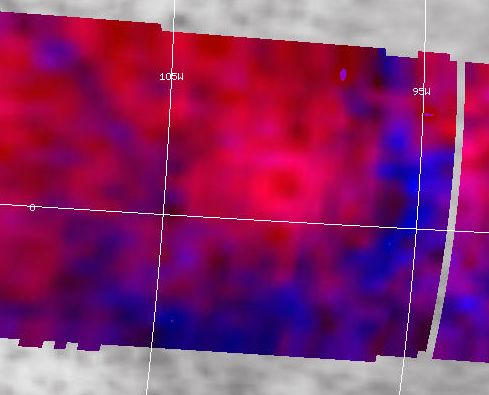Crater On Ice

Explanation:
Impact craters are common on
Earth's moon but on Jupiter's large ice moon
Europa, they are very rare.
Over time, both bodies have been subjected
to an intense
pounding by the solar system's
formative debris,
but geological activity on Europa's surface seems
to have erased most of these impact scars.
This false-color infrared image
from the Galileo spacecraft's
NIMS instrument shows
a newly discovered crater on Europa as a light red
ring feature near center surrounding a dark core.
For scale, the dark core is about 29 kilometers in diameter.
Only seven
comparably large craters
have now been identified on Europa's surface.
Red colors in the image represent a relatively pure
water
ice composition while blue colors indicate
that other minerals are present.
The crater's central dark area may contain the remnants of the impacting
body.
The icy crust
of Europa is
of great interest, as
evidence mounts
that it covers an ocean of liquid water, possibly providing suitable
conditions for life.
Authors & editors:
Robert Nemiroff
(MTU) &
Jerry Bonnell
(USRA)
NASA Web Site Statements, Warnings,
and Disclaimers
NASA Official: Jay Norris.
Specific
rights apply.
A service of:
LHEA at
NASA /
GSFC
& Michigan Tech. U.

